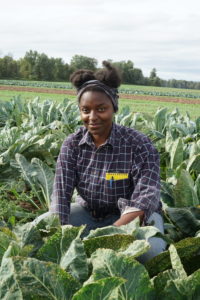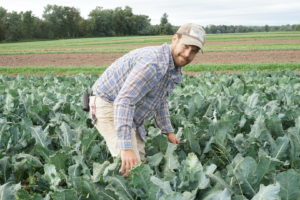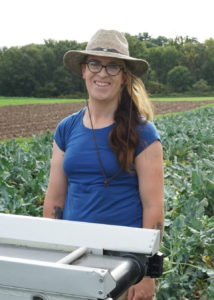In the second year of the Farm Hub’s ProFarmer program, farmer trainees develop independent projects around one crop and within a specific area of interest. The purpose is to gain direct experience managing a crop organically, from start to finish, over a growing season. This year, ProFarmers are working with strawberries, squash, and hops—with support from staff and mentors. Each ProFarmer obtains and records data on their crop, creates and executes a crop plan, and manages the crop’s needs, applying the cultural practices they learned in the field during the first year.
Three of our 2018 ProFarmer projects are previewed below.

NAILAH MARIE ELLIS
Intercropping with Strawberries
Ellis will grow strawberries, one of the crops she envisions on her future farm. She will intercrop her strawberry planting, a practice farmers have utilized for many generations. One classic example of intercropping is the “Three Sisters” planting method, developed by Native Americans who planted corn, beans, and squash together.
By growing symbiotic crops in close proximity to one another, Ellis will introduce biological diversity into the system as a potential way to reduce pest and pathogen pressure on the strawberries, both as plants and fruits. On nearly a quarter of an acre of farmland, Ellis will intercrop half of the plot with flowers (e.g., marigolds) and culinary herbs (e.g, sage, thyme, caraway, borage), monitoring differences in pest and disease pressure between the two halves.
The goals of this project are twofold. First, this work explores the results of intercropping as a method of growing crops in a system of increased biodiversity. The second goal is to implement a roll and crimped system to reduce tillage and experiment with growing strawberries without plastic mulch (rolled rye is the primary mulch, supplemented as needed with alfalfa straw).
She will start planting in June and complete the harvest in October, with plans to overwinter the plants so they will produce strawberries again next year.
ANDREW CASNER
Winter Squash and Compost Teas
Casner’s project involves growing winter squash seed by experimenting with actively aerated compost tea. He is passionate about composting both to reduce waste and as a tool to contribute to soil and plant fertility. His work is inspired by the methods of Dr. Elaine Ingham (president and owner of Soil Foodweb), who pioneered this approach. This method is complex and requires a great deal of diligence and attention to detail.
In brief, the process starts with high quality compost containing diverse beneficial microorganisms. Casner takes a small amount of this compost and places it into a water filled tank attached to an aerator which bubbles oxygen into the water. After several hours, the bacteria, fungi, protozoa, and nematodes from the compost multiply in the “tea.”Casner applies this tea to the winter squash as it grows in the field throughout the season. This process builds up the crop’s health and ability to forage for nutrients from the soil in partnership with the life in the soil.
The aim is to assess the potential of this fertility program as a tool to improve the productivity and vitality of the soils using materials available to organic farmers. This spring, Casner established a compost pile to reduce waste at the farm and gain more experience with all aspects of the process, from organics recycling and compost production to compost tea brewing and field application.
JAYNE HENSON
Testing Hops Varieties
Henson’s project involves growing hops, which is increasingly of interest to regional growers as a result of the 2013 New York Farm Brewery Law. This piece of legislation incentivizes the use of New York grown products and the development of local businesses pertaining to the brewing industry.
Henson will establish a one-acre hop yard containing six different varieties of hops for medicinal and brewing purposes. Already familiar with growing grains from her experience growing up on a farm in Kansas, she plans to make hops part of her future farm operation.
Growing hops presents a variety of challenges for farmers in this region. The wet climate and consistent pest pressure can create significant problems that are further compounded by the additional challenges of growing organically. Henson will be using innovative techniques, including using cuttings from cover crops and transferring those onto the hop rows to provide nutrients and control weeds in a process known as “transfer mulching.” Other techniques include creating habitats for beneficial insects to control pests, as well as close monitoring of weather patterns in conjunction with applying organic fungicides.
She looks forward to collaborating and sharing ideas with local farmers, brewers and others in the community as the season progresses.


